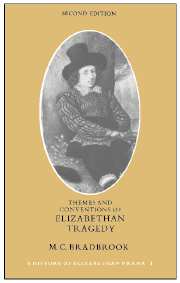Book contents
1 - INTRODUCTION
Published online by Cambridge University Press: 08 January 2010
Summary
Themes are a special form of convention; a topic which is defined by a set of concepts, or perhaps distinguished by certain formulations. This is the literary aspect of conventions, and the easiest for subsequent ages to recover.
A convention may be generally defined as an agreement between writers and readers (or spectators), whereby the artist is allowed to distort and simplify his material through a control of the distribution of emphasis. Conventions which are acknowledged have been erected into a system of rules; the neo-classic conventions, which were largely the creation of Renaissance critics, were thought to have the authority of the Ancients, and to constitute the only right way of making plays; they were prescribed as a duty.
Such ‘rules’ can be altered only after rebellion or debate — the process is like that of rescinding a law. Those conventions which are based on social assumptions can be tacitly and more easily modified, by the writers or by pressure from the readers. The Elizabethan conventions have never been acknowledged because they were not formulated or defined unless parody implies a convention to be parodied. Parody is one of the more important critical tools in the workshop criticism of the Elizabethan popular theatre, a craftsman's theatre, where tradition governed and an outgrown tradition could be recognised most clearly as discarded by its parody.
- Type
- Chapter
- Information
- Themes and Conventions of Elizabethan Tragedy , pp. 3 - 7Publisher: Cambridge University PressPrint publication year: 1980



